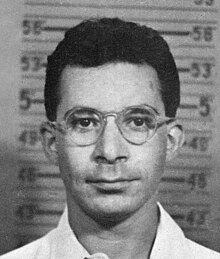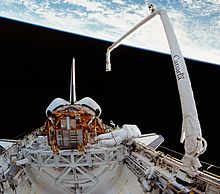Portal:Canada
| Showcase | Contents | Contributing |
Introduction
Canada is a country in North America. Its ten provinces and three territories extend from the Atlantic Ocean to the Pacific Ocean and northward into the Arctic Ocean, making it the world's second-largest country by total area, with the world's longest coastline. Its border with the United States is the world's longest international land border. The country is characterized by a wide range of both meteorologic and geological regions. It is a sparsely inhabited country of just over 41 million people, the vast majority residing south of the 55th parallel in urban areas. Canada's capital is Ottawa and its three largest metropolitan areas are Toronto, Montreal, and Vancouver.
Canada is a parliamentary democracy and a constitutional monarchy in the Westminster tradition. The country's head of government is the prime minister, who holds office by virtue of their ability to command the confidence of the elected House of Commons and is appointed by the governor general, representing the monarch of Canada, the ceremonial head of state. The country is a Commonwealth realm and is officially bilingual (English and French) in the federal jurisdiction. It is very highly ranked in international measurements of government transparency, quality of life, economic competitiveness, innovation, education and gender equality. It is one of the world's most ethnically diverse and multicultural nations, the product of large-scale immigration. Canada's long and complex relationship with the United States has had a significant impact on its history, economy, and culture.
A developed country, Canada has a high nominal per capita income globally and its advanced economy ranks among the largest in the world, relying chiefly upon its abundant natural resources and well-developed international trade networks. Recognized as a middle power, Canada's strong support for multilateralism and internationalism has been closely related to its foreign relations policies of peacekeeping and aid for developing countries. Canada is part of multiple international organizations and forums. (Full article...)
Featured article -
The Canoe River train crash occurred on November 21, 1950, near Valemount in eastern British Columbia, Canada, when a westbound troop train and the eastbound Canadian National Railway (CNR) Continental Limited collided head-on. The collision killed 21 people: 17 Canadian soldiers en route to the Korean War and the two-man locomotive crew of each train. (Full article...)
Featured biography -
Louis Alexander Slotin (/ˈsloʊtɪn/ SLOHT-in; 1 December 1910 – 30 May 1946) was a Canadian physicist and chemist who took part in the Manhattan Project. Born and raised in the North End of Winnipeg, Manitoba, Slotin earned both his Bachelor of Science and Master of Science degrees from the University of Manitoba, before obtaining his doctorate in physical chemistry at King's College London in 1936. Afterwards, he joined the University of Chicago as a research associate to help design a cyclotron. (Full article...)
Selected panorama -
National symbol -
Canadarm or Canadarm1 (officially Shuttle Remote Manipulator System or SRMS, also SSRMS) is a series of robotic arms that were used on the Space Shuttle orbiters to deploy, manoeuvre, and capture payloads. After the Space Shuttle Columbia disaster, the Canadarm was always paired with the Orbiter Boom Sensor System (OBSS), which was used to inspect the exterior of the shuttle for damage to the thermal protection system. (Full article...)
Selected vital article -
Religion in Canada encompasses a wide range of beliefs and customs that historically has been dominated by Christianity. The constitution of Canada refers to God', however Canada has no official church and the government is officially committed to religious pluralism. Freedom of religion in Canada is a constitutionally protected right, allowing individuals to assemble and worship without limitation or interference. Rates of religious adherence have steadily decreased since the 1960s. After having once been central and integral to Canadian culture and daily life, Canada has become a post-Christian state. Although the majority of Canadians consider religion to be unimportant in their daily lives, they still believe in God. The practice of religion is generally considered a private matter throughout society and the state. (Full article...)
Selected picture -
Current events
- September 20, 2024 –
- Three people are injured in a stabbing attack at a mosque in Châteauguay, Montreal, Quebec, Canada. The perpetrator is arrested and charged. (CTV News)
- September 9, 2024 –
- Finnish-Canadian sportswear mogul Peter Nygård is sentenced to 11 years in prison for sexual assault. (CBC News)
- September 4, 2024 –
- In Canada, New Democratic Party leader Jagmeet Singh announces that he has terminated the confidence and supply agreement his party made with Prime Minister Justin Trudeau's Liberal government in 2022. (CBC News)
- August 27, 2024 – Canada–Mexico relations, Mexico–United States relations
- Mexico suspends all interactions with the Canadian and American embassies in Mexico City due to claimed interference with its independence and internal affairs after both ambassadors criticized reform plans for members of the judiciary, up to and including Supreme Court justices, to be elected by popular vote. (Reuters)
- August 26, 2024 – Canada–China relations
- Canada announces a 100% tariff on imports of Chinese-made electric vehicles and a 25% tariff on Chinese steel and aluminum. (AP)
- August 22, 2024 – 2024 Canada railway shutdown
- Canadian National Railway and Canadian Pacific Kansas City lock out roughly 10,000 unionized railroad workers in Canada, leading to a railway stoppage that impacts many North American supply chains and may cost the economy of Canada C$341 million per day. (Reuters)
Did you know -

- ... that a member of the House of Lords was the principal of a Canadian junior school?
- ... that Banner in the Sky inspired a Canadian dentist to climb the Matterhorn?
- ... that Dan Finnerty was cast in Single All the Way so that he could cross the Canada–U.S. border and join his wife, Kathy Najimy, on the set of the film?
- ... that the documentary comedy films Being Canadian and When Jews Were Funny explore the filmmakers' cultural identity through interviews with dozens of comedians?
- ... that the Falcon Lake Incident is considered "Canada's best-documented UFO case"?
- ... that the shores of Kesagami Lake in Kesagami Provincial Park (northern Ontario, Canada) are surrounded by "exceptional" peat cliffs reaching 4 metres (13 ft) in height?
- ... that Lyle Bauer continued to attend Canadian Football League executive meetings despite being unable to speak due to his treatment for stage four throat cancer?
Featured list -
The Prince of Wales Trophy, also known as the Wales Trophy, is a team award presented by the National Hockey League (NHL). Named for Prince Edward, Prince of Wales (later King Edward VIII and then Duke of Windsor), it has been awarded for different accomplishments throughout its history. (Full article...)
Main articles
Associated Wikimedia
The following Wikimedia Foundation sister projects provide more on this subject:
-
Commons
Free media repository -
Wikibooks
Free textbooks and manuals -
Wikidata
Free knowledge base -
Wikinews
Free-content news -
Wikiquote
Collection of quotations -
Wikisource
Free-content library -
Wikiversity
Free learning tools -
Wikivoyage
Free travel guide -
Wiktionary
Dictionary and thesaurus
































